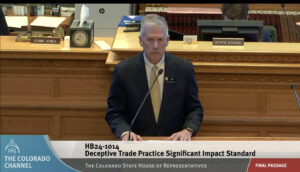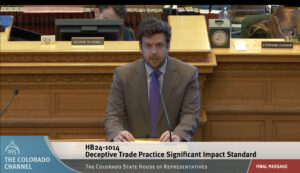Once again this year, it will fall to the Colorado Senate to decide whether to make a significant change to the Colorado Consumer Protection Act that could increase the number of deceptive-trade-practice lawsuits filed in this state.
Colorado House members on Monday approved House Bill 1014 by a heavily partisan but overwhelming 41-23 vote. Introduced on the first day of the session by majority Democrats, the measure represents one of the first significant bills to make it successfully through one of the chambers, slightly more than a month into the 2024 session.
Sponsored by Democratic Reps. Mike Weissman of Aurora and Javier Mabrey of Denver, the proposal revives a 2023 debate begun over whether the CCPA — the state law protecting consumers against fraud perpetrated by businesses — is too difficult to prosecute. At issue is a requirement that plaintiffs seeking treble damages and attorney’s fees that CCPA cases allow prove the harm done to them was part of a “significant public impact” — a mandate laid out by the Colorado Supreme Court in 1998, 29 years after passage of the law.
House Bill 1014 makes a simple adjustment to the law, establishing that evidence a person has engaged in an unfair or deceptive trade practice is enough to constitute a significant impact to the public. Proponents and opponents disagree on how widespread an effect the change could have, not only on plaintiffs’ ability to file lawsuits that could result in larger penalties but on the cost of living, which already constitutes a problem in Colorado.
Could more construction lawsuits be coming?
A handful of defense attorneys argued during a House Judiciary Committee hearing on Wednesday that removing the “significant impact” clause could allow people with individual beefs over products made or work done by companies to claim a deceptive trade practice and seek a much bigger payout. One area that could impact is homebuilding, where someone could claim fraud on alleged shoddy work on a house and entice attorneys who might not otherwise take such a case to bring it to court on the prospect of a richer payout, said John Mill of Mill Construction Law.

Colorado state Rep. Rick Taggart argues Monday against a bill to change Colorado’s deceptive-trade-practice law.
Such claims of fraud could extend to consumer products that led to injuries among users, even if the users didn’t read instructions, said Rep. Rick Taggart, a Grand Junction Republican and former executive for The Timberland Company and Swiss Army Brands. That will lead to rising insurance costs that represent one more burden against companies already struggling with new mandated benefits and increased regulations, he said.
“Please, we’ve placed enough burden on small, medium and large businesses,” Taggart said before final approval of HB 1014 on Monday. “We are ethical people, and we run our companies in an ethical manner. We do not need this legislation.”
Sponsors push back on high-cost arguments
Weissman and Mabrey noted, however, that Colorado is just one of five states right now that have the significant-public-impact test in place, and they argued the majority of the country is not suffering cost-of-living hikes from the kinds of lawsuits that Colorado lacks because of the provision. Mabrey said that Colorado’s law is “uniquely weak” and, as such, allows for scheming business owners to take advantage of renters or others because of “obscure and nonsensical impediments to justice for marginalized customers.”

Colorado state Rep. Javier Mabrey on Monday discusses his bill that would change Colorado deceptive-trade-practice law.
Weissman acknowledged a boost in deceptive-trade-practice lawsuits is a likely outcome, but he said that would be a good step to protect consumers in a state where the bar to file such actions now is so high that wronged customers can’t get aid from the legal system. Even with the change, attorneys won’t be able to seek treble damages — awards of up to three times actual or compensatory damages — unless they establish bad-faith conduct by a business through clear and convincing evidence, which will remain a high bar to clear.
“It is hard to get treble damages. It really should be,” Weissman told the judiciary committee last week. “We are not looking to break new ground in Colorado. We are looking to join the overwhelming majority of other states in having a functioning Consumer Protection Act.”
Next step for deceptive-trade-practice bill
Just four Democrats in the House joined with all Republicans in the chamber to oppose HB 1014 — Speaker Julie McCluskie of Dillon and Reps. Shannon Bird of Westminster, Bob Marshall of Highlands Ranch and Marc Snyder of Manitou Springs. But the proposal could have a more difficult time making it through the Senate, even with Democrats holding a 23-12 majority there.
Last year, HB 1192 — another CCPA reform bill sponsored sponsored by Weissman — passed the House with a comfortable majority before a Senate committee stripped two key provisions from it.
One, like HB 1014, sought to specify that a defective product or service did not have to have a significant public impact to constitute a violation of the CCPA. Another sought to remove a requirement that a violator of the law have acted “recklessly,” again lowering the bar for filing a CCPA lawsuit.
Moderate Democratic Sen. Dylan Roberts of Frisco was the deciding vote on the Senate Judiciary Committee to nix those clauses in 2023. While new Senate Majority Leader Robert Rodriguez removed Roberts and his swing vote from the Senate Local Government & Housing Committee in November, he left him on the judiciary panel to again serve as a gatekeeper of sorts for legal bills.
